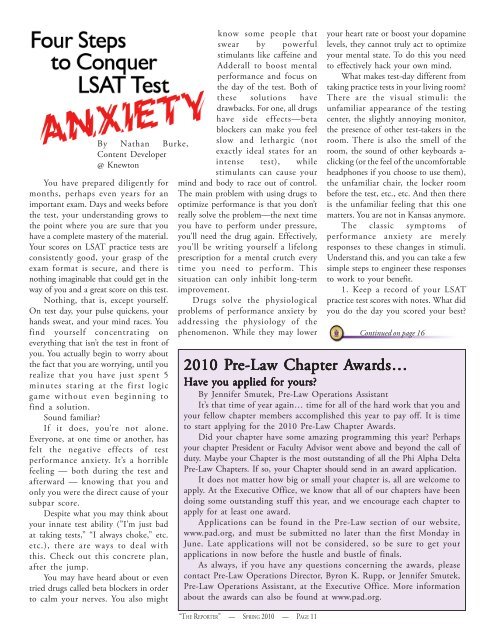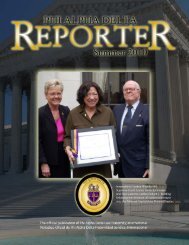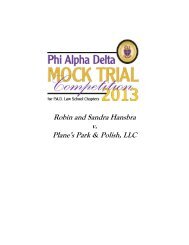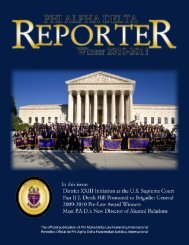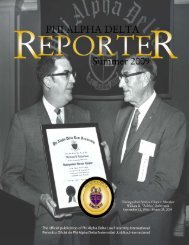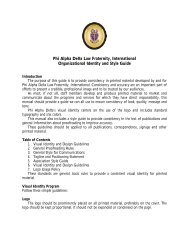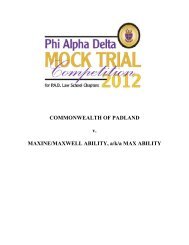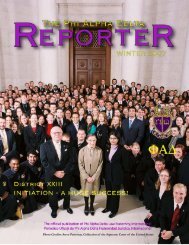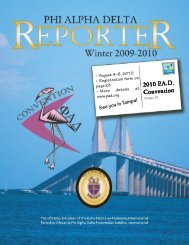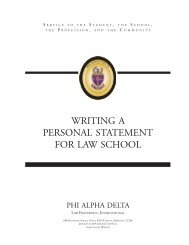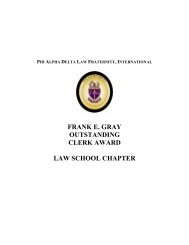Spring 2010 - Phi Alpha Delta
Spring 2010 - Phi Alpha Delta
Spring 2010 - Phi Alpha Delta
Create successful ePaper yourself
Turn your PDF publications into a flip-book with our unique Google optimized e-Paper software.
By Nathan Burke,<br />
Content Developer<br />
@ Knewton<br />
You have prepared diligently for<br />
months, perhaps even years for an<br />
important exam. Days and weeks before<br />
the test, your understanding grows to<br />
the point where you are sure that you<br />
have a complete mastery of the material.<br />
Your scores on LSAT practice tests are<br />
consistently good, your grasp of the<br />
exam format is secure, and there is<br />
nothing imaginable that could get in the<br />
way of you and a great score on this test.<br />
Nothing, that is, except yourself.<br />
On test day, your pulse quickens, your<br />
hands sweat, and your mind races. You<br />
find yourself concentrating on<br />
everything that isn’t the test in front of<br />
you. You actually begin to worry about<br />
the fact that you are worrying, until you<br />
realize that you have just spent 5<br />
minutes staring at the first logic<br />
game without even beginning to<br />
find a solution.<br />
Sound familiar?<br />
If it does, you’re not alone.<br />
Everyone, at one time or another, has<br />
felt the negative effects of test<br />
performance anxiety. It’s a horrible<br />
feeling — both during the test and<br />
afterward — knowing that you and<br />
only you were the direct cause of your<br />
subpar score.<br />
Despite what you may think about<br />
your innate test ability (”I’m just bad<br />
at taking tests,” “I always choke,” etc.<br />
etc.), there are ways to deal with<br />
this. Check out this concrete plan,<br />
after the jump.<br />
You may have heard about or even<br />
tried drugs called beta blockers in order<br />
to calm your nerves. You also might<br />
know some people that<br />
swear by powerful<br />
stimulants like caffeine and<br />
Adderall to boost mental<br />
performance and focus on<br />
the day of the test. Both of<br />
these solutions have<br />
drawbacks. For one, all drugs<br />
have side effects—beta<br />
blockers can make you feel<br />
slow and lethargic (not<br />
exactly ideal states for an<br />
intense test), while<br />
stimulants can cause your<br />
mind and body to race out of control.<br />
The main problem with using drugs to<br />
optimize performance is that you don’t<br />
really solve the problem—the next time<br />
you have to perform under pressure,<br />
you’ll need the drug again. Effectively,<br />
you’ll be writing yourself a lifelong<br />
prescription for a mental crutch every<br />
time you need to perform. This<br />
situation can only inhibit long-term<br />
improvement.<br />
Drugs solve the physiological<br />
problems of performance anxiety by<br />
addressing the physiology of the<br />
phenomenon. While they may lower<br />
<strong>2010</strong> Pre-Law Chapter Awar<br />
wards…<br />
Have you applied for yours?<br />
By Jennifer Smutek, Pre-Law Operations Assistant<br />
It’s that time of year again… time for all of the hard work that you and<br />
your fellow chapter members accomplished this year to pay off. It is time<br />
to start applying for the <strong>2010</strong> Pre-Law Chapter Awards.<br />
Did your chapter have some amazing programming this year? Perhaps<br />
your chapter President or Faculty Advisor went above and beyond the call of<br />
duty. Maybe your Chapter is the most outstanding of all the <strong>Phi</strong> <strong>Alpha</strong> <strong>Delta</strong><br />
Pre-Law Chapters. If so, your Chapter should send in an award application.<br />
It does not matter how big or small your chapter is, all are welcome to<br />
apply. At the Executive Office, we know that all of our chapters have been<br />
doing some outstanding stuff this year, and we encourage each chapter to<br />
apply for at least one award.<br />
Applications can be found in the Pre-Law section of our website,<br />
www.pad.org, and must be submitted no later than the first Monday in<br />
June. Late applications will not be considered, so be sure to get your<br />
applications in now before the hustle and bustle of finals.<br />
As always, if you have any questions concerning the awards, please<br />
contact Pre-Law Operations Director, Byron K. Rupp, or Jennifer Smutek,<br />
Pre-Law Operations Assistant, at the Executive Office. More information<br />
about the awards can also be found at www.pad.org.<br />
“THE REPORTER” — SPRING <strong>2010</strong> — PAGE 11<br />
your heart rate or boost your dopamine<br />
levels, they cannot truly act to optimize<br />
your mental state. To do this you need<br />
to effectively hack your own mind.<br />
What makes test-day different from<br />
taking practice tests in your living room?<br />
There are the visual stimuli: the<br />
unfamiliar appearance of the testing<br />
center, the slightly annoying monitor,<br />
the presence of other test-takers in the<br />
room. There is also the smell of the<br />
room, the sound of other keyboards a-<br />
clicking (or the feel of the uncomfortable<br />
headphones if you choose to use them),<br />
the unfamiliar chair, the locker room<br />
before the test, etc., etc. And then there<br />
is the unfamiliar feeling that this one<br />
matters. You are not in Kansas anymore.<br />
The classic symptoms of<br />
performance anxiety are merely<br />
responses to these changes in stimuli.<br />
Understand this, and you can take a few<br />
simple steps to engineer these responses<br />
to work to your benefit.<br />
1. Keep a record of your LSAT<br />
practice test scores with notes. What did<br />
you do the day you scored your best?<br />
Continued on page 16


